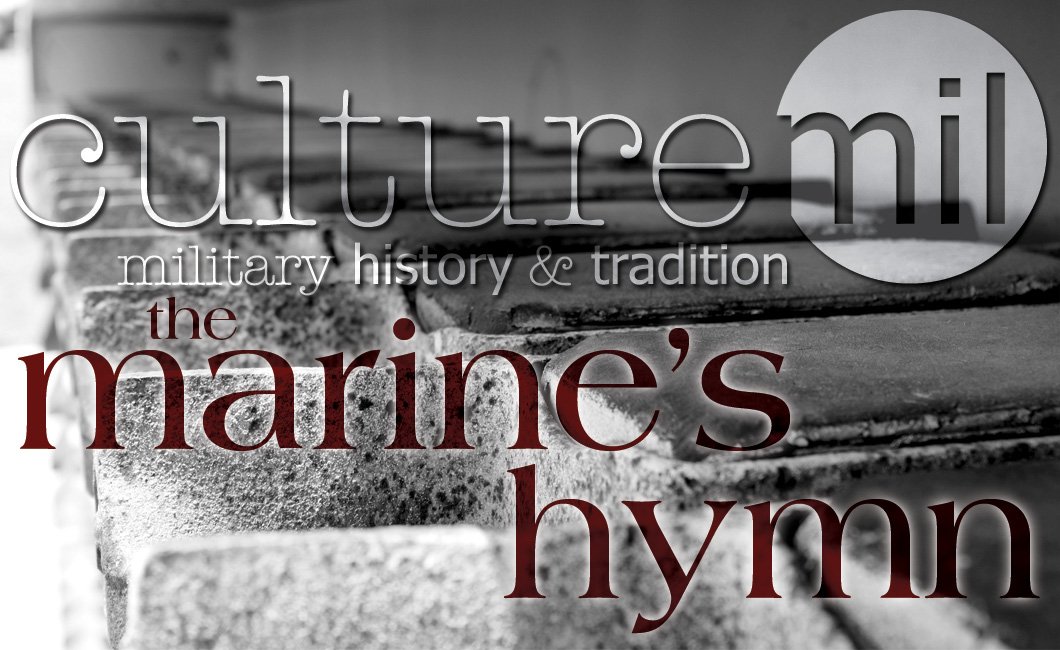- www.marines.com/history-heritage/traditions
- www.hqmc.marines.mil/hrom/NewEmployees/AbouttheMarineCorps/Hymn.aspx
- www.wikipedia.org
Written by Jenifer Chrisman on June 15, 2015.
From the Halls of Montezuma,
To the shores of Tripoli;
We fight our country’s battles
In the air, on land, and sea;
First to fight for right and freedom
And to keep our honor clean:
We are proud to claim the title
Of United States Marine.
Our flag’s unfurled to every breeze
From dawn to setting sun;
We have fought in every clime and place
Where we could take a gun;
In the snow of far-off Northern lands
And in sunny tropic scenes;
You will find us always on the job
The United States Marines.
Here’s health to you and to our Corps
Which we are proud to serve;
In many a strife we’ve fought for life
And never lost our nerve;
If the Army and the Navy
Ever look on Heaven’s scenes;
They will find the streets are guarded
By The United States Marines.
Musically based on the Gendarmes’ Duet, an 1867 revision of the comic opera Geneviève de Brabant by Jacques Offenbach, the “Marines' Hymn” is the oldest official song of the United States armed forces. Copyrighted on August 18, 1919, the Commandant of the Marine Corps officialized the Hymn in 1929.
The Commandant’s authorization of the verses brought about a change to the first verse, lines four through eight:
Pre-1929 version:
Admiration of the nation,
we’re the finest ever seen;
And we glory in the title
Of United States Marines.
Authorized change:
First to fight for right and freedom
And to keep our honor clean;
We are proud to claim the title
Of United States Marine.
A further change was made on November 21, 1942, by Commandant Thomas Holcomb. The first verse’s fourth line “On the land as on the sea” was replaced by “In the air, on land, and sea,” reflecting the addition of aviation to the Corps.
The author of the lyrics is unknown, although legend says the lyrics were penned by a Marine on duty in Mexico. And while some believe the lyrics were written in the 1800s, no known text has been found pre-20th century. The music itself, according to Walter F. Smith, the second leader of the Marine Band, “The melody (Genevieve de Brabant) is not in the exact form of the Marine Hymn, but is undoubtedly the aria from which it was taken.” He also noted, “I am informed, however, by one of the members of the band, who has a Spanish wife, that the aria was one familiar to her childhood and it may, therefore, be a Spanish folk song.”
The author transposed the first two lines of the Hymn to be more pleasing to the ear rather than chronological. From the Halls of Montezuma refers to the Battle of Chapultepec during the Mexican-American War in 1847, a United States victory over forces holding Chapultepec Castle. Its capture paved the way for the fall of Mexico City. To the shores of Tripoli refers to the Battle of Derne during the First Barbary War in 1805, a decisive victory led by a detachment of 10 United States Marines with a mercenary army against the forces of Ottoman Tripolitania. It also was the first recorded land battle the U.S. fought overseas.
As a gesture of respect, the Hymn is normally sung at a position of attention. But the third verse also can be used as a toast at formal ceremonies and events.
The Marines' Hymn has a long and rich history and is a significant part of the Marine Corps culture. It is an eloquent reminder of their brotherhood, courage and sacrifice.
Sources:




